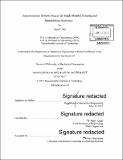Supernumerary robotic fingers for single-handed grasping and manipulation assistance
Author(s)
Wu, Faye Y
DownloadFull printable version (21.28Mb)
Other Contributors
Massachusetts Institute of Technology. Department of Mechanical Engineering.
Advisor
Harry Asada.
Terms of use
Metadata
Show full item recordAbstract
Hemiparetic patients, such as stroke survivors, have limited functionality in one of their hands and must constantly face challenges in completing simple bimanual tasks of daily living. A new type of wearable robot, namely Supernumerary Robotic Fingers (or SR Fingers for short), was developed to augment the capability of the human hand such that a variety of prehensile and manipulation tasks can be performed single handedly. These wearable robotic fingers may provide chronic hemiparetic patients with the assistance they need to lead independent and productive lives. The aim of this thesis, besides designing a lightweight prototype to emulate the functionality of a second hand, is to address fundamental challenges associated with performing tasks with a single hand assisted by the SR Fingers. First, the robot must follow and support the human hand as the control decision evolves. A postural synergy-based control algorithm is developed to integrate the grasping motion of the SR Fingers with that of the human fingers so the users can control the robot in an implicit and intuitive manner as if it were part of their own body. Second, unlike a robot sitting on a table, the SR Fingers are mounted on the human forearm and, thereby, the human hand motion during manipulation disturbs the position and orientation of the robot. A data-driven latent space impedance control method is used to compensate for this disturbance such that the robot can secure the object and at the same time allow natural human movement to be carried out during manipulation. Simulations and experiments have demonstrated that a pair of robotic fingers can assist the user in performing single-handed grasping and manipulation tasks without requiring explicit commands.
Description
Thesis: Ph. D., Massachusetts Institute of Technology, Department of Mechanical Engineering, 2017. Cataloged from PDF version of thesis. Includes bibliographical references (pages 137-145).
Date issued
2017Department
Massachusetts Institute of Technology. Department of Mechanical EngineeringPublisher
Massachusetts Institute of Technology
Keywords
Mechanical Engineering.